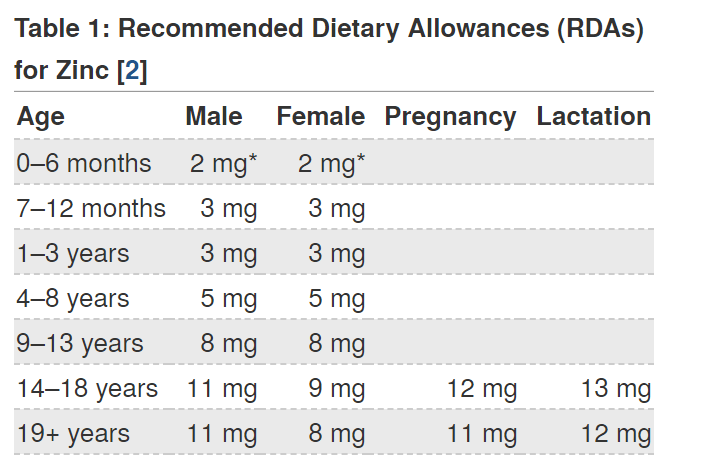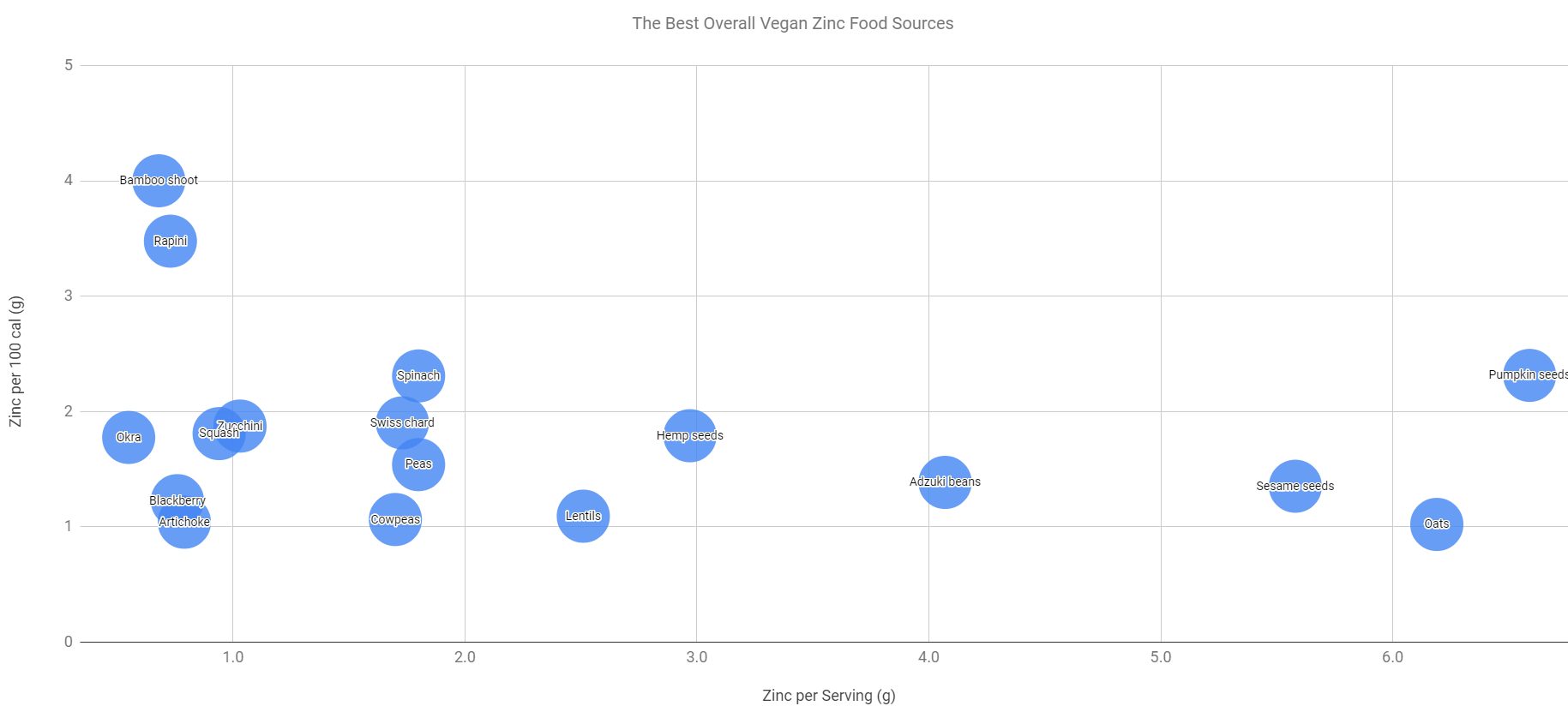Zinc is one of the most important minerals to get in your diet.
Unfortunately, it’s harder to get on vegan and vegetarian diets than a typical omnivorous diet. If needed, there are supplements you can get (here’s my list of the best vegan zinc supplements).
I compiled a list of 120+ vegan whole foods, along with their nutritional info. On this page, you’ll find a list of the top 30 vegan zinc food sources per serving.
But before I get to the foods, there’s a few things you should know about zinc.
Table of Contents
How Much Zinc Do You Need?
According to the NIH, adult males should get at least 11 mg per day, while females should get 8 mg.

This is easy to do if you eat zinc-rich foods.
Why Zinc is Harder to Get For Vegans
The body has no way of storing zinc, so you need to get it on a regular basis (Source).
Vegans also need more zinc because zinc from plants has a lower bio-availability than from meat (Source).
To make the problem even worse, many vegan sources of zinc contain phytates, which are anti-nutrients that can inhibit the absorption of zinc and other nutrients. To combat that, I highly recommend looking into soaking your beans, which can eliminate a large percentage of phytates.
Overall, aim to get around 50% more of the RDA as a vegan (Source).
Finally, on to the foods!
The Best Vegan Zinc Food Sources (Per 100 grams)
These are the 30 best whole foods that I could find per 100 gram serving. It’s a thorough list based on data from the USDA’s food database.
| Food | Zinc per 100 g |
|---|---|
| Pumpkin seeds | 10.30 |
| Hemp seeds | 9.90 |
| Sesame seeds | 7.75 |
| Pine nuts | 6.44 |
| Cashew | 5.61 |
| Chia seeds | 4.57 |
| Pecans | 4.53 |
| Flaxseed | 4.32 |
| Brazil nut | 4.06 |
| Oats | 3.97 |
| Peanuts | 3.27 |
| Almonds | 3.11 |
| Walnut | 3.09 |
| Wheat flour (whole-grain) | 2.96 |
| Rye grain | 2.65 |
| Hazelnut | 2.44 |
| Buckwheat groats | 2.42 |
| Pistachio nuts | 2.20 |
| Seaweed (dried) | 2.00 |
| Adzuki beans | 1.77 |
| Chickpeas | 1.53 |
| Macadamia nut | 1.30 |
| Lentils | 1.27 |
| Peas | 1.24 |
| Black beans | 1.12 |
| Coconut meat | 1.10 |
| Quinoa | 1.09 |
| Kidney beans | 1.07 |
| Cowpeas | 1.03 |
| Navy beans | 1.03 |
| Fava bean | 1.01 |
The top 8 foods are a tier above the rest, although there’s zinc found in a lot of diverse vegan foods.
Seeds are a great source, with pumpkin and sesame seeds ranked at the top.
Grains are also a good source of zinc, with oats, rye grain, and buckwheat all in the top 8. Cereals may contain these grains, and often are fortified with even more zinc.
Finally, legumes (kidney beans, lentils, chickpeas, etc.) and nuts are good sources of zinc as well, although can be calorie-dense. Also note that they contain phytate, an antinutrient that can affect zinc absorption. Try to mix up your zinc sources to avoid issues.
The Best Vegan Zinc Sources if You’re Watching Your Calories
Just because there aren’t too many vegetables on the top of that list, doesn’t mean that they aren’t a good source of zinc.
When I adjusted the values and sorted by zinc per 100 calories, vegetables rose up the list:
| Food | Serving | Energy (kcal) |
Zinc (mg) per 100 calories
|
|---|---|---|---|
| Bamboo shoot | 1 shoot | 17 | 4.0 |
| Rapini | 5 stalks | 21 | 3.5 |
| Asparagus | 4 spears | 13 | 2.8 |
| Pumpkin seeds | 1 cup | 285 | 2.3 |
| Spinach | 1 bunch | 78 | 2.3 |
| Swiss chard | 10 leafs | 91 | 1.9 |
| Zucchini | 1 large | 55 | 1.9 |
| Squash | 1 large | 52 | 1.8 |
| Arugula | 1 cup | 5 | 1.8 |
| Hemp seeds | 3 tbsp | 166 | 1.8 |
| Okra | 8 pods | 31 | 1.8 |
| Radish | 2 large | 3 | 1.7 |
| Lettuce (red leaf) | 0.5 head | 20 | 1.6 |
| Peas | 1 cup | 117 | 1.5 |
| Bok choy | 1 cup | 9 | 1.4 |
| Adzuki beans | 1 cup | 294 | 1.4 |
| Sesame seeds | 0.5 cup | 413 | 1.4 |
| Cucumber | 0.5 cucumber | 23 | 1.3 |
| Blackberry | 1 cup | 62 | 1.2 |
| Broccoli | 1 cup | 31 | 1.2 |
| Napa cabbage | 1 cup | 13 | 1.2 |
| Lentils | 1 cup | 230 | 1.1 |
| Cauliflower | 1 cup | 27 | 1.1 |
| Kale | 2 cup | 15 | 1.1 |
| Cowpeas | 1 cup | 160 | 1.1 |
| Artichoke | 1 large | 76 | 1.0 |
| Oats | 1 cup | 607 | 1.0 |
| Watercress | 10 sprigs | 3 | 1.0 |
| Cashew | 0.5 cup | 393 | 1.0 |
| Pine nuts | 0.5 cup | 454 | 1.0 |
Rapini, spinach, and many more vegetables have high amounts of zinc with very few calories. The only issue is that for some of them you have to eat many servings to reach your RDA.
That being said, they should still play a big part in your diet.
The Very Best Plant-Based Sources of Zinc
From the data in the two lists above, we can find the very best overall zinc sources.
Foods that have a high amount of zinc per 100 calories AND per serving.
The easiest way to identify them is with a bubble chart, which you can see below. The most zinc-dense foods should rise to the top-right corner of it. Click it to see the full version.
This is one of the rare cases for nutrients where no foods really show up in the top right corner.
However, some are pretty close. If you’re trying to maximize your zinc intake while limiting calories and servings, try to eat a lot of:
- Pumpkin seeds
- Sesame seeds
- Oats
- Adzuki beans
- Hemp seeds
The Best Types of Plant-Based Foods High in Zinc
Unless you really love planning, it’s more useful to categorize everything we’ve seen so far to get a general idea of which types of foods contain a good amount of zinc.
Those foods happen to be:
- Seeds – Almost every seed is high in zinc and they take up many of the top spots per 100 grams of food. Pumpkin seeds, hemp seeds, and sesame seeds are the 3 best vegan sources of zinc.
- Nuts – While they have a lot of calories, you can get close to the RDA for zinc in a serving or two of many nuts. The best options are pine nuts, cashews, and pecans.
- Leafy greens – When you compare foods in terms of zinc per calorie, leafy greens like spinach and swiss chard are comparable with seeds. You’ll have to eat a lot of vegetables to get a substantial amount of zinc from them, but it won’t add up to too many calories.
In practical terms, most people don’t need to worry about getting more zinc as long as they have a reasonable portion of at least one of the above food types.
And if you can combine them (e.g. a big salad topped with seeds), even better.
Worried About Not Getting Enough Zinc?
Zinc is important, and although you should be able to get it through these plant-based foods high in zinc, it’s possible that you have further restrictions that make it difficult.
If you need alternatives to avoid zinc deficiencies, the 2 main ones are:
- Supplements – A zinc supplement is convenient and easy.
- Fortified foods – Zinc is often added to cereals, non-dairy milks and yogurts, and other packaged products.
I’d caution you not to overdo it, as zinc toxicity is a real thing.
Finally, if you are eating enough foods high in zinc or fortified foods, and are still experiencing symptoms of a deficiency (e.g. hair loss), see a doctor. You may have an underlying issue affecting zinc absorption that needs to be addressed first.
Why Zinc is Important
Zinc is used for many parts of cellular metabolism. It’s needed for:
- A strong immune system.
- Protein synthesis
- Wound healing
- Cell division.
And more.
If you’re deficient in zinc, you’ll experience a loss of appetite and weak immune system that could lead to sickness. With severe zinc deficiencies, you could experience hair loss, diarrhea, and other issues.
There’s one more important thing before we get to the foods.


Great!
Is it possible we are missing the mushrooms here? Apparently a dependable source.
My list of foods is pretty comprehensive, but it seems I did somehow miss mushrooms.
However, they don’t seem to have much zinc in them, at least not white ones, only 0.4 mg of zinc in 1 cup.